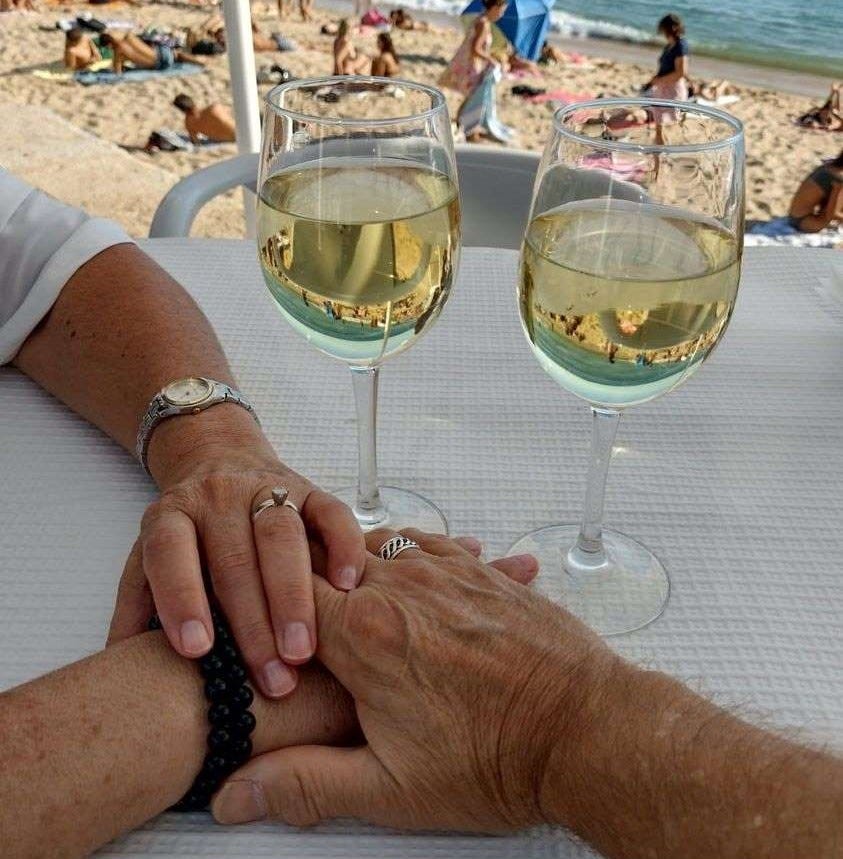Race Discrimination in Portugal
Unmasking the hidden realities.
In the sun-kissed landscapes of Portugal, where the golden shores meet vibrant cityscapes and historic architecture, there exists a shadowy undercurrent that many are unaware of or hesitant to acknowledge: race discrimination. While Portugal prides itself on its rich cultural heritage, warm hospitality, and safe environment, the truth is that discrimination based on race, religion, or where you come from continues to persist in various facets of Portuguese society.
I had planned to publish a “feel-good” post about the spring season and Jacarandas this week, but after reading last Friday’s briefing from Portugal Decoded1 with the eye-catching headline, “We Need to Talk about Racism,” I decided to shift gears. I am not an investigative reporter, but I am a curious writer who believes that it’s important to write about both comfortable and uncomfortable topics especially when it comes to living as an expat/immigrant in Portugal. This post falls into the latter category and should be considered a high-level overview.
The Portugal Decoded post began with this paragraph:
“In the early hours of Saturday, several attacks targeted North African migrants in Porto, with at least two of the victims receiving assistance in hospital. Following the attacks, six men were identified, and one was arrested for illegal possession of a weapon. Reports suggests that at least one of the suspects is linked to 1143 Group, a Sporting CP fan group with ultranationalist and neo-Nazi views”.
What is 1143 Group?
Call it ignorance, but I had never heard of this group. And I did not realize that the beloved national sport of football (a/k/a soccer) in Portugal, had an extension of dangerous extremists.
According to the Global Project Against Hate and Extremism (GPAHE), Grupo 1143 is a long-standing Portuguese ultra sports collective, renowned for their fanatical team support. Such factions are prevalent across Europe, but Grupo 1143 has notably aligned itself with the Portuguese far right, particularly with the Portuguese Hammerskins, a notorious skinhead group known for its violence in recent decades.
Originating in 2003, amidst the proliferation of ultra football culture in Portugal, Grupo 1143 emerged as a breakaway faction from the Juventude Leonina (Juve Leo) ultras. Juventude Leonina is the name of one of four ultras groups that supported Sporting Clube de Portugal (Sporting CP)2, a Portuguese sports club based in Lisbon. Comprised predominantly of "carecas" (skinheads) under the age of thirty, Grupo 1143 has epitomized the fusion of football fandom with extremist leanings.
Where do these groups come from?
Quoted from the GPAHE website: “In recent years, far-right extremist and hate movements motivated by white supremacy, xenophobia, anti-LGBTQ+ beliefs, antisemitism, anti-Muslim sentiment, religious discrimination, anti-woman activity, and gender bias have been growing across the globe”.
“These movements share underlying discriminatory ideologies, and too often have been exported from the U.S. The consequence of the growth in these movements is violence and the dangerous integration of bigoted and racist ideas into societal discourse, government policies, and political platforms. Increasingly, as far-right extremist movements have gained in strength, established taboos around far-right extremism have collapsed as mainstream political parties cooperate with extremists once considered out of bounds”.
Warning: You may find the following disturbing.
I would not recommend you do this, but I did check out the Ultras-Tifo forum, an ultras forum providing news and reports from football supporters world-wide (not a secure site), and it was disturbing to me to read about how to purchase liquid parrafin online. The header (below) was also disturbing to me to look at. The forum has over 45,000 participants.
Another image I found is even more disturbing.
So, what happened on May 3rd?
There were at least three attacks, categorized as “racist” against primarily North African immigrants in central Porto. The first attack happened when a group of males attacked two North Africans with baseball bats. The attackers fled the scene in a car.
A while later, a group of North African immigrants were attacked by armed and hooded males wielding baseball bats and knives while the immigrants were at home asleep. The immigrants were beaten for over thirty-minutes while being subjected to racial slurs, and the attackers destroyed the contents of the house.
Shortly after, another immigrant was attacked on the street by a group of males, with one possessing a firearm.
If you want to learn more about gun laws in Portugal, read this post from my friend and fellow Substack writer, Nancy Whiteman from Expat in Portugal.
Were these attacks provoked? Was it retaliation? Did a drug deal go bad? Was it hyped-up in the news for some political advantage? Or was it unprovoked and these immigrants were attacked because of the color of their skin or their religious beliefs?
I don’t know. But according to the Portugal Decoded infographic (linked below), it seems that there have been other incidents that can arguably be classified as race discrimination. For example, according to the infographic, in 2023, a group of youths in Olhão attacked and stole items from several Asian immigrants and even went as far as to share one of the attacks on social networks.
Underlying root causes.
I found a study published in January 2020 by the University of Birmingham revealing that far-right extremists in Portugal today are motivated by different factors compared to their counterparts from the 1970s. While the previous generation, influenced by the Colonial War and post-revolutionary turmoil, focused on combating Communism and preserving Portugal's multi-racial empire, contemporary extremists, largely from the working class, have embraced violence to defend a perceived threat to white Portugal and Europe posed by multiculturalism.
The researchers highlight two distinct periods of far-right political violence in Portugal: the transition from authoritarianism to democracy (between April 25, 1974, and the mid-1980s) and from the late 1980s to the present.
Dr. Raquel Da Silva of the University of Birmingham noted that over the four decades of Portuguese democracy, extreme right-wing political violence has undergone profound changes in both its methods and participants. Initially, armed clandestine networks emerged from nationalist groups, whereas more recently, there's been a convergence of ultra-nationalism with neo-Nazi racism from the skinhead subculture.
It’s not just subculture groups.
I don’t think it’s just subculture groups that are race averse. I think you can find it anywhere. It’s probably deep-rooted in the culture much like it is in many parts of the United States. For example, I was in an Uber recently, and the driver (an older white man) told me that his “traditional” Lisbon neighborhood that he lives in has “so many Africans living there now.” This isn’t the first time I have been told similar things.
And I don’t just think it’s only about race. I also think there’s an undercurrent of resentment for expat/immigrants - what people may perceive as “rich” foreigners driving up prices. Last year, a food delivery driver came to our apartment door to bring us our order, and asked Paul and I if we were living in Portugal and if this was our apartment. We said, yes. He then went on to say (in sarcastic undertones) that it must be nice to afford to live in such a nice place. He said that he works hard, doesn’t make a lot of money, and can barely afford to rent a room and there’s nothing left at the end of the week for much more. He continued talking like that for a bit longer. We listened politely - but it was uncomfortable.
I understand that many immigrants often come to Portugal because where they come from is much worse. They may struggle here economically and socially. And they are no doubt a target for discrimination.
There are monsters everywhere in this world.
I often wonder why people choose to belong to hate groups. I wonder if it’s really because they believe in “the cause” or if there are other reasons. Peer pressure? A feeling of control or empowerment? Resentment? The desire to belong to something? Is it fear? Ignorance? It is probably all these reasons and many more. I’m not an expert.
But I do know that it’s not all sunshine and happiness here in Portugal. I’m not bashing Portugal – I love it here. But this country has problems racially, economically, and politically, just like any other country. And where there are problems, there are factions always willing to kick it up a notch or two, to stir the pot, to create fear-based solutions. There are monsters everywhere in this world.
Is Portugal safe for immigrants?
For the most part, yes, I think so. It’s certainly much safer than many other countries including my home country of the United States where there are many hate groups and a bunch of incredibly angry, disillusioned people. But I’m also an older white woman with Portuguese heritage, so I may not be the best person to ask. If you look at this chart from Portugal Decoded, perhaps you can decide for yourself.

But we do need to talk about racism.
As someone who primarily writes about moving to and living in Portugal, I don’t think it would be fair to my readers to always paint a rosy picture when in fact, there are some dark undercurrents. That’s why we do need to continue to talk about racism and discrimination in Portugal and for that matter, worldwide. And not just with the people who agree with us but also with people who have different viewpoints. But we don’t have to do that violently. Violence has never resolved anything of lasting value.
I don’t have answers to this problem. And it’s an unpleasant one. And scary. And disturbing. But I wanted to bring it up in this issue of Our Portugal Journey. I personally feel that we all must continue to have this most uncomfortable conversation. Because I’m an immigrant myself. And I’m the granddaughter of immigrants. And I’m the friend of many immigrants. And if folks take a long look into their own heritages, they’ll find that for the most part, we all come from immigrants.
One of the reasons I personally love living in Portugal is because of the diversity of the people and the mixture of cultures. I have found this experience of meeting new people from various parts of the world refreshing, insightful and educational. It has provided me with an awareness that in the past, I never fully comprehended. This experience has enriched my life in so many positive ways. This in itself might not make a significant difference in the world, but I hope in some small way I can set a positive example.
Thank you for reading Our Portugal Journey. This blog has no paywall – you can subscribe for free and receive all the content. However, for those who wish to become a Supporting Subscriber, either on a monthly or annual basis, I have outlined those options. There is also an option for a one-time donation via Buy me a Coffee.
Until next time…
Obrigada!
Carol.
Portugal Decoded is a Substack blog that I highly recommend folks read especially if they already live in Portugal or are planning a future move to this country.
In October 2019, the current management of Sporting Clube de Portugal, with the presidency of Frederico Varandas, rescinded the protocols it signed with the Associação Juventude Leonina and the Ultras XXI Directive due to the escalation of violence that culminated in attempted physical attacks on managers and other fans”, during Sporting’s futsal victory against the Leões de Porto Salvo (6–1), at Pavilhão João Rocha. Source: Portugal Wikipedia






It really is a great shame that all these fascists are getting out of their caves. I’m starting to not recognize my own country anymore, and yet, somehow, it isn’t surprising
Thank you for sharing the news and the background details. It's important that your readers are aware and can form balanced views and expectations of living in Portugal.